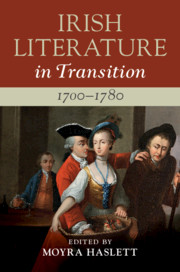Book contents
- Irish Literature in Transition, 1700–1780
- Irish Literature in Transition
- Irish Literature in Transition, 1700–1780
- Copyright page
- Contents
- Illustrations
- Contributors
- Series Preface
- General Acknowledgements
- Introduction
- Part I Starting Points
- Part II Philosophical and Political Frameworks
- Chapter 4 The Prejudices of Enlightenment
- Chapter 5 The Molyneux Problem and Irish Enlightenment
- Chapter 6 Samuel Whyte and the Politics of Eighteenth-Century Irish Private Theatricals
- Part III Local, National, and Transnational Contexts
- Part IV Gender and Sexuality
- Part V Transcultural Contexts
- Part VI Retrospective Readings
- Index
Chapter 5 - The Molyneux Problem and Irish Enlightenment
from Part II - Philosophical and Political Frameworks
Published online by Cambridge University Press: 28 February 2020
- Irish Literature in Transition, 1700–1780
- Irish Literature in Transition
- Irish Literature in Transition, 1700–1780
- Copyright page
- Contents
- Illustrations
- Contributors
- Series Preface
- General Acknowledgements
- Introduction
- Part I Starting Points
- Part II Philosophical and Political Frameworks
- Chapter 4 The Prejudices of Enlightenment
- Chapter 5 The Molyneux Problem and Irish Enlightenment
- Chapter 6 Samuel Whyte and the Politics of Eighteenth-Century Irish Private Theatricals
- Part III Local, National, and Transnational Contexts
- Part IV Gender and Sexuality
- Part V Transcultural Contexts
- Part VI Retrospective Readings
- Index
Summary
The Molyneux problem is a question about the nature of sensory perception that was first posed by William Molyneux, the founder of the Dublin Philosophical Society, in correspondence with the English philosopher John Locke in 1688. The problem asks whether a blind man who has learned to distinguish between different shapes by his sense of touch alone would be able, upon having his vision restored, to make the same distinctions using only his sense of sight. Molyneux’s question has been called the most important problem in the history of Irish philosophy, and the reason for its significance is the wide variety of epistemological, theological, linguistic, and aesthetic considerations to which it gave rise. This chapter identifies and documents the major stages in the early development of Molyneux’s problem in eighteenth-century Ireland, England, and France. Along the way, the chapter draws on contemporary religious analogies, surgical evidence, and fictional experiments in order to bring a new perspective to current debates about the meaning of ‘Enlightenment’ in eighteenth-century Irish intellectual culture.
Keywords
- Type
- Chapter
- Information
- Irish Literature in Transition, 1700–1780 , pp. 110 - 128Publisher: Cambridge University PressPrint publication year: 2020
- 1
- Cited by

